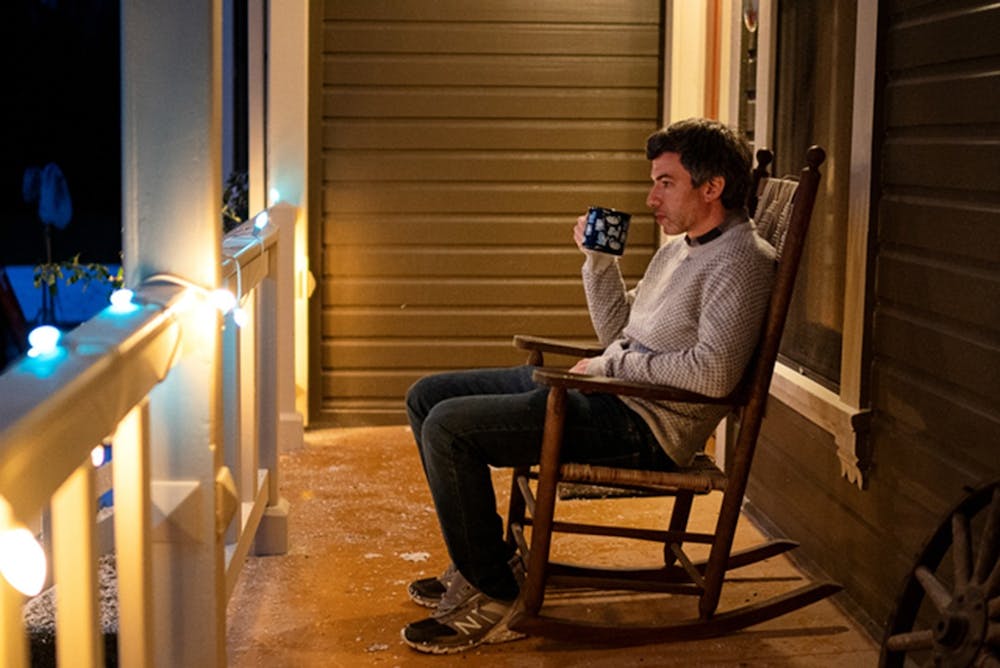The next step in beloved weirdo Nathan Fielder’s cringe-comedy evolution is his new show “The Rehearsal.” Its wild season finale premiered on Aug. 19.
In the show, Fielder adopts the same socially awkward, semi-fictional persona he had in “Nathan For You.” The show follows Fielder, playing this persona, as he gives ordinary people the chance to rehearse major life events and confrontations by building life-size sets and hiring actors to run through every possible outcome.
In the first episode, Fielder helps a man who is lying to his friend about having an advanced degree. Fielder hires an actress to play the friend and builds an exact replica of the bar where the man plans to confess his lie. With a heightened budget and complete creative freedom, the scale of the matter is nothing short of extravagant.
This episode establishes the overall theme of the series. Before they begin the rehearsal process, the man compares Fielder to Willy Wonka and himself to Charlie Bucket. Even though Fielder makes a joke out of this, the metaphor perfectly describes his role in the show.
Related: [COLUMN: ‘Bodies Bodies Bodies’ is a chaotic and wickedly funny portrait of Gen Z culture]
Like Willy Wonka, Fielder helps people with his unlimited resources. But, it can be argued that he’s doing so for selfish reasons. He’s committed to the bit, even if that means the jokes are at the expense of the show’s subjects. The show exists in a morally-gray area that isn’t fully explored until the final two episodes.
As the first episode ends accompanied by Gene Wilder’s “Pure Imagination,” the show effectively transitions from an absurd yet straightforward study in human behavior to a haunting examination of empathy, manipulation, responsibility and reality itself.
In the second episode we meet Angela, the subject of the next rehearsal. In Angela’s rehearsal, she will raise a child from the age of zero to 18 in the span of three months in order to prepare for motherhood.
Angela’s rehearsal ends up being the focus of the rest of the season, with Fielder becoming more personally involved as things progress. At the end of the second episode, he moves into the Washington farmhouse that has been rented for her and begins co-parenting with Angela. He assumes the role of “pretend daddy,” and the rest of the season deals with the effects of this decision.
The latter half of the season gives viewers a more intimate look into Fielder’s mind. Eventually, he begins to have rehearsals within the rehearsal. Anytime something happens that he didn’t account for, he gathers actors to go through the event again, trying to spot what he did wrong.
This process repeats itself until the actual reality of the show becomes so warped and convoluted that neither the audience nor Fielder know what’s real anymore. Even within the rehearsal, Fielder has an innate inability to live in the present. This comes to a head in what is arguably the best and most surreal episode of the season, “The Fielder Method.”
Related: [COLUMN: 5 films premiering at the major fall film festivals to keep on your radar]
The season finale is particularly resonant, as Fielder must confront the effects that his experiment has had on both the rehearsal subjects and the actors involved. One of the child actors, Remy, refuses to leave the set because he believes that Fielder is his real dad. This makes Fielder spiral, because he can’t figure out what led this to happen.
Somehow, the show is a multitude of things at once. It’s philosophical, heartfelt, cringe-worthy and insightful. But, at its core, it’s still a comedy. Fielder balances all these things that would typically make for a tonal mess because of his self-awareness and ability to turn the ordinary into the absurd.
In the finale’s final moments, as Fielder gives an emotional speech to a child actor playing Remy, he’s in his most vulnerable and empathetic state. He realizes that the entire experiment was misguided, and that spontaneity isn’t such a bad thing. Is this moment of clarity real? Not really, but that leaves something to be explored in season 2.




